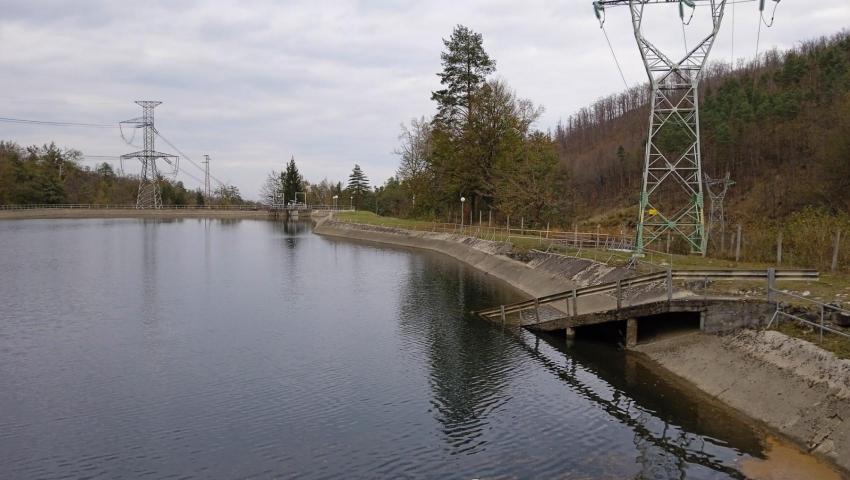In conditions of reduced inflow to the complex dams, the MoEW ensures a balanced distribution of the available water resource
There is no water regime in any of the settlements with drinking-domestic water supply from the 14 dams managed by the MoEW

The Ministry of Environment and Water (MoEW) has warned of an alarming trend of decreasing river runoff of inland rivers, which is due to reduced water resources and low levels of water volumes in the country's dams. Prolonged drought, high temperatures, lack of precipitation, mild winter with a lack of spring flood are a complex of factors that inevitably lead to a decrease in the amount of water in the rivers.
According to data from the National Institute of Hydrology and Meteorology (NIMH), in June and July of this year, the average monthly water quantities of the rivers were significantly less than in 2023.
For June, the total volume of river runoff in the country is 777 million m³, and its value is 72% less compared to June 2023 (in the Danube catchment basin, the volume of river runoff is 82% less compared to June 2023., in the Black Sea catchment basin – by 46% less, in the Eastern White Sea catchment basin – by 26%, and in the West White Sea catchment basin – by 64% less compared to June 2023).
For July, the total volume of river runoff in the country is 454 million m³, and its value is 50% less compared to July 2023 (in the Danube catchment basin, the volume of river runoff is 56% less compared to July 2023., in the Black Sea catchment basin - by 50%, in the Eastern White Sea catchment basin - by 32%, and in the West White Sea catchment basin - by 61% less compared to July 2023).
Since the beginning of August, the river levels and the corresponding water quantities in the country have not changed significantly or are decreasing. For most of the territory of the country, the precipitation is below the climatic norms.
Details of river runoff trends can be found in the supplementary information.
Compared to previous years, the dams with low levels are: "Ticha" (water source for Shumen, Veliki Preslav and Targovishte), "Kamchia" (water source for Varna, Burgas and other settlements along the Black Sea), "Yasna Polyana" (water source for Burgas and other settlements and resorts from the southern Black Sea coast and Burgas region), "Yastrebino" (water source for the town of Antonovo, Erevish district, 9 villages in the area and the town of Omurtag) and "Asenovets" (main water source for Sliven).
The MoEW manages the use of the waters of the complex and important dams in the country - 52 in number, of which 14 are for drinking and domestic water supply. These 14 complex dams, whose waters are used for drinking and domestic purposes, are filled to about 68% of the total volume. At the moment, there is no water regime introduced in any of the settlements that are supplied with water from the complex dams.
In conditions of reduced water income to the complex and significant dams, the actions of the ministry are aimed at ensuring a balanced distribution of the available water resource through monthly schedules. The allocation of water is carried out in strict compliance with the priorities set out in the Water Law, namely: primarily for drinking and domestic purposes, then for agricultural purposes and finally for other purposes, including industrial purposes, recreation and hydropower.
The tendency to reduce the inflow to the dams has been observed for the third year in a row, which is why at the beginning of the year the Ministry of Internal Affairs and Communications informed the Ministry of Regional Development and Public Works, "Bulgarian Waterworks Holding" EAD, the waterworks operators, the Ministry of Agriculture and food and "Irrigation Systems" EAD for the low level of filling of part of the dams and the need for them to take timely actions to ensure the drinking-domestic water supply of the population and the needs of agriculture.
The Ministry of Internal Affairs and Communications has additionally and promptly notified the water supply operators and "Irrigation Systems" EAD that, in order to ensure the water intake in case of incoming inflow for the conditions of a dry and very dry year, the requests are reduced, as well as that the responsible institutions should take actions to limit the losses of water and inclusion of additional water sources.
Identifying water supply problems and finding solutions is the responsibility of water supply companies, municipal mayors and regional governors. The Ministry of Regional Development and Public Works implements the policy in the water and sanitation sector. The policy in the "Irrigation and fish breeding" sector is within the competences of the Ministry of Agriculture and Food.
The MoEW supports the implementation of investments related to the improvement of water supply and sewage systems in populated areas by financing projects under the "Environment 2021-2027" Program and the Enterprise for the Management of Environmental Protection Activities.
The MoES monitors the condition of the complex and significant dams on the basis of daily information received from the companies that operate the dam walls and their facilities. The Ministry will participate in the working group with experts from all relevant ministries, which will be a kind of coordination center in order to achieve greater efficiency of the institutions' joint efforts.
Information on available water volumes is published daily on the MoEW website in the section "Prescentur", "MoEW Bulletins", "Water", "Daily Bulletin"
